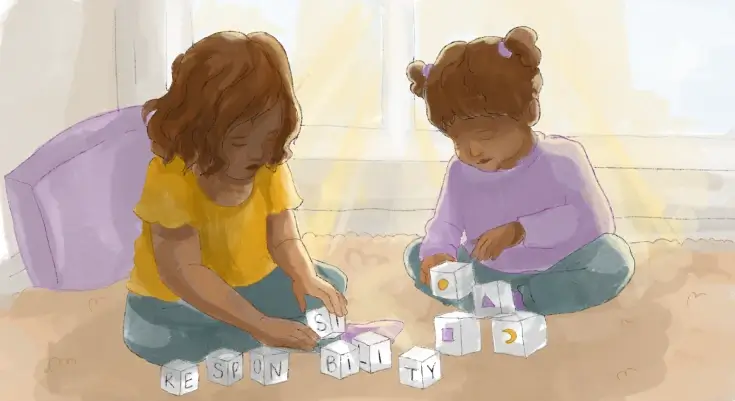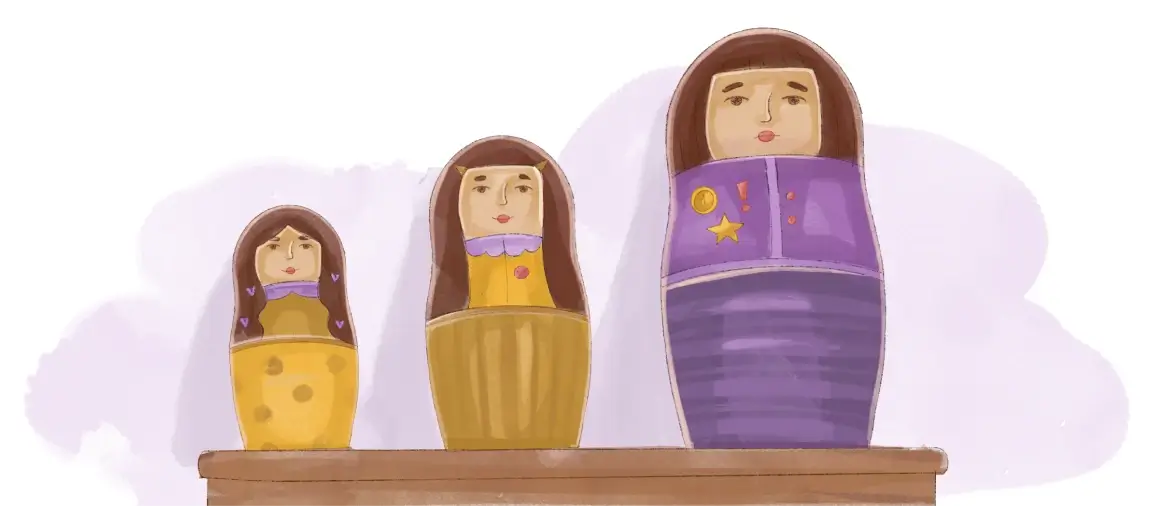Growing up as the oldest daughter in a family can be tough. Household tasks, taking care of the youngest children as big sis, and not having time for yourself are all signs of eldest daughter syndrome.
The prolonged duration of the situation where the oldest female siblings perform adult functions without parental support may result in the eldest daughter’s trauma. Check to see if your past continues to have an impact on your present with a quick self-discovery test.
What is Eldest Daughter Syndrome?
Eldest Daughter Syndrome is a term for a phenomenon (not an official diagnosis) characterized by a deep-rooted sense of perfectionism and the constant need to care for others, connecting to the gender and societal expectations of firstborn daughters.
An Austrian psychotherapist, Alfred Adler, first proposed this idea of this term in the early 20th century. It is related to birth order theory, which states that a person’s birth order influences their character and the events that transpire in their lives.
After family therapist Katie Morton posted a video on TikTok listing eight symptoms of this Eldest Daughter Syndrome, it went viral nowadays. It’s been viewed over 6 million times.
It’s important to mention that eldest daughter syndrome is not an official mental health diagnosis from DSM-5. However, many people have seen this scenario happen in their lives or families. Research supports that and indicates that firstborn children tend to mature earlier. [1]

The eldest daughter syndrome signs
Here are some eight signs that oldest daughters have in common:
- Perfectionism: A tendency toward perfectionism may develop in a child whose parents have high expectations for them. It is common for older daughters to be looked up to as role models for their younger siblings. Researchers found that firstborn daughters may be more likely than their siblings to have anxiety, be perfectionists, and be hard on themselves. [2]
- People-pleasing: Constantly prioritizing other people’s needs over one’s own can lead to people-pleasing behaviors, making it difficult to set healthy boundaries.
- Overachievement: To prove their worth and capabilities, firstborn daughters may push themselves to excel in various areas of life, from academics to careers, which can lead to burnout. In contrast to their siblings, studies indicate that older sisters are the most likely to achieve success and hold leadership roles. [3]
- Hyperindependency: The oldest daughters may find it hard to ask for help when needed because they are used to caring for others, becoming hyperindependent and self-sufficient.
- Suppressing emotions: Putting on a strong front can cause first-born girls to hold their feelings inside and avoid being vulnerable.
- Anxiety: As a big sister, you have many duties, which can be stressful. You have to handle everything from housework to adult relationship issues.
- Guilt complex: You may tend to feel guilty even over the smallest things since, starting from a young age, you might have had adult responsibilities that were dangerous to fail.
- Struggling to form relationships: They also might have difficulty in their adult relationships.
The Eldest Daughter Syndrome Quiz
If you are the oldest daughter in your family, you may have wondered if you have Eldest Daughter Syndrome. Take this quick quiz to find out.
1. Do you feel a strong sense of responsibility for your siblings?
a) I always feel like I need to protect and guide them.
b) I help when I can, but I know they need to learn on their own, too.
c) Rarely, they’re capable of taking care of themselves.
2. How do you react when faced with a challenge?
a) I am in charge and work hard to figure things out.
b) I try to solve it myself first, but I’m open to asking for help if needed.
c) I prefer to let someone else handle it.
3. Are you a perfectionist?
a) Yes, I have very high standards for myself and others.
b) A little. I strive for excellence but understand that perfection isn’t always possible.
c) No
4. How would others describe your role in group settings?
a) The leader: It comes naturally for me to lead and steer the group.
b) The mediator: I help people talk to each other and find a middle ground.
c) The follower: Usually, I let other people lead.
5. Do you feel pressure to set a positive example for your siblings?
a) All the time—I think what I do directly affects how they act.
b) I try to be a good example, even though I am imperfect.
c) I will go my own way and let them do the same.
6. How do you deal with criticism?
a) I’m my own worst critic and take it personally.
b) Constructive criticism is okay, but offensive comments can hurt.
c) Everyone is entitled to their opinion, but it doesn’t define me.
7. Do you find it difficult to ask for help?
a) Yes, I can handle everything by myself.
b) I try to be self-sufficient but know when to reach out.
c) I’m comfortable asking for assistance when I need it.
Results
Mostly A’s: You show signs of Eldest Daughter Syndrome. Being responsible, trying to be perfect, and being a good leader are all great qualities, but do not forget to take care of yourself, too. If needed, ask for help from mental health professionals for an intense feeling of responsibility.
Mostly B’s: You have some traits associated with older sibling syndrome, but you can balance your responsibilities with your needs. Let yourself have time for your needs and self-care while setting a good example.
Mostly C’s: You may not strongly identify with Eldest Daughter Syndrome, and that’s okay! You can focus on your plan of action and let others take the lead when they need to. This is a useful skill.
The roots of Eldest Daughter Syndrome
The roots of oldest-sister syndrome are often very deep in childhood memories and how families work. Here’s a closer look at them:
1. Parentification and family dynamics
Each family’s dynamics and power structures are different. Some children find themselves compelled to become parents, either to their parents or younger siblings like the youngest sister, middle child, or other siblings.
This is called “parentification.” As a result of parental absence, illness, addiction, or emotional unavailability, this can happen.
Since they are seen as the most capable or responsible, the oldest daughter or sibling is often the first to be parentified. Parentification trauma is often caused by unachievable responsibility for children.
Other dysfunctional families expect the oldest daughter to be the peacemaker or mediator when there are relationship problems or feelings. This scenario is different from what can happen with middle children.
2. Gender roles and expectations
In many cultures, mothers expected their oldest daughters to take care of their younger siblings from a very young age.
In rural areas in the 1800s, oldest girls often took on the role of “surrogate mothers” in big families where the mother had a lot to do. For example, the oldest daughters were often shown as the main caretakers and moral pillars in Victorian novels. [4]
In Eastern societies, too, family hierarchy and devotion to ancestors were very important. For example, the oldest woman in the family would often take on big jobs to help her parents and younger siblings. In places like China, Japan, and India, oldest daughters are considered very important for keeping the family together and doing their duty as daughters, unlike oldest brothers. [5]
3. Cultural and Societal Factors
In collectivist cultures, the duties of family are very important. The mental health of the eldest daughters may be adversely affected if they perceive that they do not meet the expectations of their family. [6]
In contrast, individualistic cultures are likely to have a negative effect on the mental health of girls because they make them deal with stress and identity crises when they have to balance personal goals with family duties.
Also, the oldest daughters of immigrant families are the ones who have to deal with the pressures of both their old culture and their new home life the most.
It has been found that mothers who were under parental stress before they had their children (for example, because of immigration) may have daughters who show early signs of adrenal puberty. [1]
4. Intergenerational trauma
Often unconsciously, trauma can be transmitted through generations in addition to family dynamics. [7] A mother or grandmother might unintentionally pass on these patterns to their children if they experienced the eldest daughter’s trauma in their own family of origin.
How do you heal from eldest daughter syndrome?
Discover yourself
To feel better today, start to discover yourself, your likes, and how to manage your feelings. Breeze app helps you untangle emotions with mood tracking, quick tests, journaling, and healthy routines.
What’s more, we have created a 28-Day Well-being Healing Plan for your mental well-being. It might help you reframe negative thoughts, build resilience, and move forward more positively.
Prioritize yourself
When you grow up taking care of other people before taking care of yourself, it can be challenging to think about putting yourself before others. Remember to take care of yourself first. Keep fostering your independence while maintaining healthy relationships with your family.
Learn setting boundaries
As the oldest daughter, you may have developed a reputation for being a people-pleaser, consistently responding with “yes” when someone requests assistance. Still, it is important to set healthy boundaries to preserve yourself and avoid or overcome burnout from all these emotional burdens of being the oldest female sibling.
Here is what you can try:
- Reduce phone time by draining people
- You do not always have to offer advice or answer questions, especially if you do not have the mental resources to do so
- Inform your loved ones of your boundaries and the consequences of violating them
Ask for assistance or help
Help from a mental health professional is recommended if mental health problems are getting in the way of your daily life or performance at work or school. For example, positive self-talk, social and intrapersonal skills, and setting boundaries can all be learned in therapy sessions with licensed marriage and family therapists.
Additionally, providing a secure space for individuals to discuss and overcome habits and relationships passed down through generations can aid in reducing generational trauma.
Sources:
- Molly M. Fox, Jennifer Hahn-Holbrook, Curt A. Sandman, Jessica A. Marino, Laura M. Glynn, Elysia Poggi Davis, Mothers’ prenatal distress accelerates adrenal pubertal development in daughters, Psychoneuroendocrinology, 2024.
- Carmo, C.; Oliveira, D.; Brás, M.; Faísca, L. The Influence of Parental Perfectionism and Parenting Styles on Child Perfectionism. Children, 2021.
- Carette, B., Anseel, F., & Van Yperen, N. W. (2011). Born to learn or born to win? Birth order effects on achievement goals. Journal of Research In Personality
- McLaren, Angus & Davidoff, Leonore & Hall, Catherine. (1989). Family Fortunes: Men and Women of the English Middle Class, 1780-1850. The American Historical Review.
- Chao, R. K. (1994). Beyond parental control and authoritarian parenting style: Understanding Chinese parenting through the cultural notion of training. Child development.
- Fung, J., Wong, M. S., & Park, H. (2018). Cultural background and religious beliefs. Handbook of parenting and child development across the lifespan.
- Reese, E. M., Barlow, M. J., Dillon, M., Villalon, S., Barnes, M. D., & Crandall, A. (2022). Intergenerational Transmission of Trauma: The Mediating Effects of Family Health. International journal of environmental research and public health.
Disclaimer
This article is for general informative and self-discovery purposes only. It should not replace expert guidance from professionals.
Any action you take in response to the information in this article, whether directly or indirectly, is solely your responsibility and is done at your own risk. Breeze content team and its mental health experts disclaim any liability, loss, or risk, personal, professional, or otherwise, which may result from the use and/or application of any content.
Always consult your doctor or other certified health practitioner with any medical questions or concerns
Breeze articles exclusively cite trusted sources, such as academic research institutions and medical associations, including research and studies from PubMed, ResearchGate, or similar databases. Examine our subject-matter editors and editorial process to see how we verify facts and maintain the accuracy, reliability, and trustworthiness of our material.
Was this article helpful?







